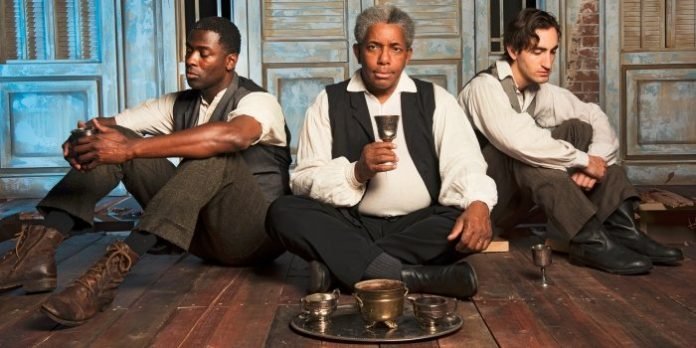As Black History Month in Canada comes to a close, Pacific Theatre presents Matthew Lopez’s The Whipping Man, the story of a critically wounded Confederate soldier returns to his destroyed home and his newly-emancipated slaves at the end of the American Civil War. The three men are left to sort through the tangled history of slavery, race, and religion.
Director Anthony F. Ingram talks about the The Whipping Man, its place in history, the insidious nature of racism, and how it ultimately celebrates the idea of freedom.
1. The play is part drama, part-philosophical debate, part-morality play, and part-ritual. How do you describe The Whipping Man?
I describe it as a very simple, straightforward story about three people who are trying to figure out where and how they fit into what they believe to be a brand new world. And it is a very simple story – but the implications hidden within that simplicity are immensely complicated, frightening and joyous all at once.
2. What spoke to you in wanting to take on The Whipping Man?
We get to cut off a guy’s leg, live on stage! You have no idea how much fun we’re having trying to make it as visceral and uncomfortable as we can for the audience, and not go over the top. It’s not often I get to create a magic trick, so it’s a big challenge and it’s really more fun than I should be allowed to have at work. But I also liked that we get to put some people who aren’t white on stage. I really believe that the theatre of Vancouver needs to actively work to be more reflective of cultures other than Northern Europe if it’s going to survive or continue to be relevant. So, a play like this one is a small step toward that.
3. Do you find yourself doing any more research for a historical play such as this than a contemporary play?
The research stuff is what I love about my job! I get to learn new things about history and other cultural experiences every time I take on a new project. It’s like every few months I get a brand new hobby that I can jump into and drench myself in. And there’s never enough time to do as much research as I’d like. My knowledge of the American Civil War was practically non-existent and what I did know was gleaned from movies like Gone With The Wind. I didn’t even know that there was actually a President of the Confederate States! So, I started reading and watching documentaries after reading the play a couple of times. Then I went back to the script and was amazed at how historically accurate the details of the story are – and it’s just laid in there so smoothly and it’s so integral to the action of the play that you don’t even notice it. It’s all part of the characters’ story.
4. What did you discover during your research that stood out for you?
The whole idea of Jews fighting on the side of the Confederation – fighting for the right to own slaves. I had a hard time wrapping my brain around that. I figured “well, there’s a great theatrical conceit created by this playwright to set up an interesting idea.” But, it’s no conceit. There’s actually a cemetery dedicated to Confederate Jewish soldiers. There’s a photograph from the beginning of the war of a group Virginia Grays which includes a Jewish tailor and John Wilkes Booth. And there are letters from Jewish soldiers writing about having to improvise a seder, much the way the characters in The Whipping Man do. There was also a lively debate among the Jewery as to whether or not slavery was biblically sanctioned and a prominent New York Rabbi published a defense of the practice.
5. It has an interesting set-up with African-American Jews celebrating Seder at the end of the American Civil War – what is in it for contemporary Canadian theatre-goers?
The American Civil war is integral to the history of anyone in the western hemisphere who claims African heritage; so, if anything, we’re serving the people of that community with the telling of this story. And if Canada really is a multi-cultural nation, every Canadian has a duty to be aware of stories such as this one and to be part of the discussion that the play investigates and instigates.

6. The playwright uses contemporary language in the play – do you see that as causing confusion for the audience? How does the use of contemporary language help the play?
Well, they didn’t speak that much differently than us three hundred years ago, but, no; if anything, it removes a wall that might stand between the characters and the audience. Shakespeare did the same thing. He wrote in the language that his audience spoke and that made the Romans and the Greek characters he wrote about accessible to his Elizabethan contemporaries. I think the language in this play serves the same function.
7. You have said that “Canadians we generally consider ourselves free of racism… But really our form of racism is more insidious and subtle”. Those seem like harsh words in a country that celebrates its multiculturalism at every opportunity. How do you see the Canadian form of racism “more insidious and subtle”?
You asked earlier what a play about Jewish African-Americans has for a Canadian audience, and I think that question is unintentionally predicated on the idea that Jews and African-Americans are not typical Canadians. I’ll use my profession as an example: the programming of many of our theatre companies is influenced by a subtle racism – and it’s by no means intentional, it’s simply that Canada inherited the theatrical traditions of British ex-patriots. The result of this is that Northern European theatrical tradition dominates and there is virtually no attempt to explore the traditions of other cultures. It’s not a conscious choice to ignore or exclude the numerous cultural traditions that exist in our city – it’s just an assumption that the Northern European form is the best and that everyone can relate to it. And then we wonder why our audience is dwindling. When I went out shopping over the Christmas holidays, it became plainly obvious that if anyone is a visible minority in this city, it’s me. And yet, how many stories about people of Asian descent do you see on the stages of our city? Or an even more mind-boggling question: how many people of Asian descent do you see performing on our stages? It’s no wonder theatre is seen as elite and irrelevant – to a large segment of this city, it is. I’m hungry for a Canada where we give equal value to the multiple cultures that make up our society, so that we can get to the point where each cultural experience is taken as obviously relevant to everyone. And not just in the theatre, but in every public forum, from politics on down.
8. The parallels between the slaves and the Jewish exodus from Egypt are obvious – does that play into Lopez’s story, and how you approach the material?
Absolutely. He uses the coincidence of the Civil War ending and the time of Passover as a jumping off point. From there, the reverberations of the Jewish tradition echo through the events of the time and the experience of the people involved. It’s really quite amazing and makes you marvel at the accidents of history.
9. With its U.S. focus, how do you see The Whipping Man honouring Black History Month in Canada?
Anyone who thinks the Black experience in Canada doesn’t include slavery is deluded or kidding themselves. Their history on our East Coast is appalling and I don’t think it’s much better here in Vancouver where there was once a whole community near Chinatown that just seemed to disappear over night. The play bears witness to an experience that is central and transformative in that history and celebrates the idea of freedom – the cost of freedom and the responsibilities that come with being free.
The Whipping Man plays Pacific Theatre (1440 W 12th Ave, Vancouver) Feb 27-Mar 21. Visit https://pacifictheatre.org for tickets and information.

